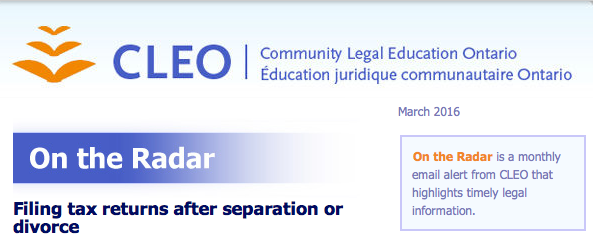Filing tax returns after separation or divorce
* Original Source: “Filing tax returns after separation or divorce” by CLEO (Community Legal Education Ontario).
http://us4.campaign-archive1.com/?u=acaece29df8d07c95ef84a763&id=a9afe17d03
Many things change after separation or divorce, including what tax credits and benefits someone might get. By filing a tax return, some benefits apply even if a person has little or no income.
This month’s On the Radar talks about some of the things that a person who is newly separated or divorced should think about when doing their tax return.
Deadline for 2015 tax returns
For many people, the deadline for sending in their 2015 tax return is April 30, 2016.
Missing the deadline could delay when people get credits or benefits from the Canada Revenue Agency (CRA). It could also mean that they have to pay a penalty or interest on money that they owe to the CRA.
Changes to marital status
On the 2015 tax form, people have to say what their marital status was as of December 31, 2015.
They check off “Divorced” if they were divorced on or before December 31.
They check off “Separated” if their relationship broke down and all of the following are true:
- the first day of their separation was on or before December 31
- they had not gotten back together as of December 31
- their separation lasted for at least 90 days
If their relationship broke down early in 2016, they fill out their 2015 tax return the same way they did when they were in a relationship. This means they check off “Married” or “Living common-law”.
Once someone has filed their tax return as “Separated” or “Divorced”, they never file as “Single” again. They can file as “Married” or “Living common-law” if they later marry or start a new common-law relationship.
Reporting changes to marital status throughout the year
People must tell the CRA if their marital status changes during the year. There are rules about when to do this.
Many people get increased tax credits and benefits after they change their status to “Separated” or “Divorced”. This is because the CRA no longer includes their ex-partner’s income when deciding:
- whether they can get certain credits and benefits
- how much they will get
Tax credits and benefits
A tax credit or benefit either:
- reduces the amount of tax that a person has to pay, or
- is money that the government pays to the person.
Some common credits and benefits are:
- the Goods and services tax/harmonized sales tax (GST/HST) credit
- the Working income tax benefit (WITB)
- the Canada child tax benefit (CCTB)
Goods and services tax/harmonized sales tax (GST/HST) credit
The GST/HST credit is money that the government pays 4 times a year to people with low or modest incomes.
People don’t have to pay taxes on the amount that they get. And they don’t need to apply for the credit. But for the CRA to decide if they can get this money, they do need to file their income tax return, even if they have no income.
Only one partner can get the credit in a married or common-law relationship. So a person might not have gotten it during their relationship.
But they may get it after they separate or divorce. This is one reason why they should tell the CRA about a change to their marital status.
Working income tax benefit (WITB)
The WITB is for people who are working or have their own business, but whose income is low.
Getting the WITB can reduce the amount of tax that the person has to pay, give them a refund, or both.
To decide whether someone qualifies and how much they might get, the CRA looks at factors like whether they have:
- a spouse or common-law partner
- a child who lived with them and was under 19 years of age as of December 31, 2015, and who was not eligible for the WITB in 2015
- a disability or if their spouse or common-law partner has a disability
If someone wants to get the WITB, they must fill out a special form and include it with their tax return.
Canada child tax benefit (CCTB)
Watch for next month’s On the Radar, when we’ll talk about the Canada child tax benefit (CCTB).
Getting help
People will have different tax questions and concerns depending on their situation.
For example, they may have a disability, special medical expenses, or be new to Canada and not sure if they have to file a tax return.
For people who can’t afford to pay to get help filling out their tax return, there are free services, including:
- Volunteer Tax Preparation Clinics, which are run through the CRA
- the Tax Preparation Assistance Program, which is run by volunteers from the Chartered Professional Accountants of Ontario and partner agencies
** This article is reproduced with permission of CLEO


